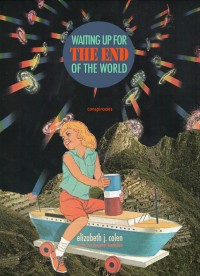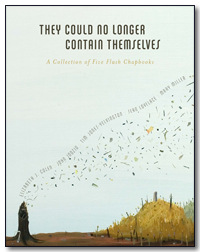25 Points: Waiting Up for the End of the World
 Waiting Up for the End of the World
Waiting Up for the End of the World
by Elizabeth J. Colen
Illustrated by Guy Benjamin Brookshire
Jaded Ibis Press, 2012
142 pages / $32.00 (color), $16.99 (BW) buy from Jaded Ibis Press
1. Conspiracy theories are enjoyable, people who embrace conspiracy theories can be depressing but when you’re not listening to one and simply letting your thoughts amble along wondering about JFK or the Lunar Landing or 9/11 you can entertain yourself for hours without getting far away from yourself—at least not too far to recognize who the hell you are when you’ve finished. It’s exactly the same principle that draws an H.P. Lovecraft to writing about fictive beasts and Tolkien to create an entirely different world to tolerate living in this one: embellishment, lies, theorizing, half-truths, all of these things provide immediate freshness to a very stagnant daily existence, and we as people cling to these in some form or another with some consistency at for at least part of our lives.
2. Sometimes conspiracy theorists creep me out; sometimes they don’t. This time, they don’t.
3. Books of poetry written on a theme, much like concept albums, are more direly hit-or-miss than mere collections of one’s best work. To let oneself think for a long time about one story and let it someday become a novel is—compared to this—a relatively easy feat, but to somehow tie together large amounts of poetry to coalesce into a book by the finish is nothing less than brilliant.
4. Sometimes themed collections of poetry fail; sometimes they succeed. This one succeeds.
5. Elizabeth J. Colen’s new collection of poetry Waiting up for the end of the World operates from a center of conspiracy—and features the descriptor “Conspiracies,” rather than poems, mind you—and though there’s ceaseless range to the content of each poem and these don’t all merely reflect one central theme per se, there is an anchor throughout of conspiracy and noted theories that’s quite comforting while reading.
6. Is that the mark of a good book of poetry? Comfort? I’m not quite sure but I think of visual artists creating fresh visions of antiquated imagery while tied to comfortable symbols or colors and I’m tempted to argue it’s true. It probably isn’t true, but this book of poetry is oddly comforting for something labeled “conspiracies.”
7. Most of the poems feature subtitles like “Lunar Landing,” “Princess Diana,” “New World Order,” and other household conspiracies that provide the aforementioned comfort, and make Colen’s description of scenes from a character’s youth or a father figure that much more effective and compelling.
8. The idea of the Lunar Landing being faked still terrifies me. These poems sort of mollify that sense of terror through looking more at the guts or emotions of the situation as opposed to the broad spectrum of technical information available (especially with the internet) but still, the idea of the Lunar Landing being faked still terrifies me.
9. Reading this collection during “election day” hoopla is ideal, but reading it in one month you’ll have another set of lunatics screaming at you and a year from now the same goes so I wouldn’t worry about it, I’d probably just buy the book.
10. Elections make Americans politically paranoid for roughly four months on either side of election day and then for a very long time we work and do a bunch of other more important shit that has nothing to do with politics. READ MORE >
November 21st, 2012 / 1:09 pm
They Could No Longer Contain Themselves
 They Could No Longer Contain Themselves:
They Could No Longer Contain Themselves:
A Collection of Five Flash Chapbooks
by Elizabeth J. Colen, John Jodzio,
Tim Jones-Yelvington, Sean Lovelace, and Mary Miller
Rose Metal Press, 2011
248 pages / $15.95 Buy from Rose Metal Press
Rating: 7.0
The problem with collections of flash fiction is their unevenness, or that the reader recognizes the unevenness more than in, say, a novel. Maybe this also applies to story collections, especially non-linked stories, though there are a few that come away feeling complete–to me, usually collections with fewer stories. I can’t think of a single flash collection that does not seem hill-and-valley. They Could No Longer Contain Themselves is no exception. I find it interesting to note, however, that the chapbooks that were linked helped me see past the valleys, as I was always aware of the range. Okay, enough of this terrible analogy. On to the individual chapbooks. READ MORE >
August 2nd, 2011 / 12:02 pm
